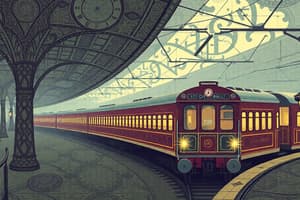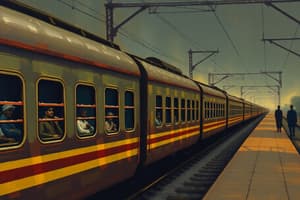Podcast
Questions and Answers
When did the first steam train operate on Indian soil?
When did the first steam train operate on Indian soil?
- 1900
- 1947
- 1825
- 1853 (correct)
During which era did the Indian Railways play a significant role in India's colonial economy?
During which era did the Indian Railways play a significant role in India's colonial economy?
- Modernization era
- British colonial era (correct)
- Independence era
- Green Revolution era
What was the primary focus of the early railway networks in India?
What was the primary focus of the early railway networks in India?
- Connecting major ports to hinterlands (correct)
- Transporting agricultural produce
- Connecting major cities
- Exporting finished goods
How much has the Indian Railways network expanded by the 1990s since independence?
How much has the Indian Railways network expanded by the 1990s since independence?
In which period did the Indian Railways experience rapid growth after independence?
In which period did the Indian Railways experience rapid growth after independence?
Since the early 2000s, what has been the primary focus of the Indian Railways?
Since the early 2000s, what has been the primary focus of the Indian Railways?
What is one of the high-speed rail corridors being constructed by the Indian Railways?
What is one of the high-speed rail corridors being constructed by the Indian Railways?
Which organization has been established to oversee the high-speed rail projects in India?
Which organization has been established to oversee the high-speed rail projects in India?
What technological upgrade has the Indian Railways implemented to streamline ticket booking?
What technological upgrade has the Indian Railways implemented to streamline ticket booking?
Which sustainable practice has the Indian Railways adopted to reduce pollution?
Which sustainable practice has the Indian Railways adopted to reduce pollution?
What type of system has been installed to automatically apply brakes in case of potential collisions or derailments?
What type of system has been installed to automatically apply brakes in case of potential collisions or derailments?
What is one of the challenges faced by the Indian Railways despite its modernization efforts?
What is one of the challenges faced by the Indian Railways despite its modernization efforts?
Flashcards are hidden until you start studying
Study Notes
Indian Railways: A Journey Through Time and Transformation
The Indian Railways is a vast network that has connected the vast expanse of India, shaping the lives and livelihoods of millions of people. Spanning over 169,000 kilometers, it's the fourth-largest rail network globally and the largest in Asia. In this article, we'll delve into the history of Indian Railways and its current efforts towards modernization.
History
The first steam train on Indian soil rolled out in 1853, although the idea for a railway system in India was suggested as early as 1825. The first lines were built between Bombay (now Mumbai) and Thane, and later, between Calcutta (now Kolkata) and Raniganj. During the British colonial era, the Indian Railways played a significant role in India's colonial economy. The early networks primarily focused on connecting major ports to the hinterlands, facilitating the export of raw materials and the import of finished goods.
After independence, the Indian Railways experienced rapid growth, with the network expanding by more than 100,000 kilometers by the 1990s. During this period, the Indian Railways also played a crucial role in the Green Revolution, transporting agricultural produce across the nation.
Modernization
Since the early 2000s, the Indian Railways has undergone a massive transformation, focusing on modernization, increased efficiency, and improved safety.
-
High-speed railways: The Indian Railways has embarked on the construction of high-speed rail corridors, such as the Mumbai-Ahmedabad High-Speed Rail Corridor (set to be operational in 2026), and the Delhi-Mumbai High-Speed Rail Corridor (planned). The National High-Speed Rail Corporation (NHSRCL) has been established to oversee these projects, which will significantly reduce travel times between major cities.
-
Projects to improve safety: The Indian Railways has implemented several measures to improve safety, including:
- An Advanced Train Management System (ATMS) to monitor train movement and detect potential safety hazards.
- Modification of signaling systems to improve the separation of trains.
- Installation of Automatic Train Protection (ATP) systems, which automatically apply brakes in case of imminent collision or derailment.
-
Technological upgrades: The Indian Railways has invested heavily in modern technology to improve efficiency and customer experience. Some notable examples include:
- The integration of electronic ticket booking systems to ease the booking process for passengers.
- The installation of Wi-Fi on many trains, providing passengers with internet access.
- The adoption of e-ticketing through IRCTC, which streamlined the ticket booking process and significantly reduced the need for physical tickets.
-
Sustainability: The Indian Railways has also become more environmentally conscious, focusing on reducing its carbon footprint and promoting sustainable practices. Some initiatives include:
- The introduction of solar-powered trains, which run on electricity generated from solar panels installed on rooftops and alongside the tracks.
- The use of bio-toilets, which convert human waste into compost, reducing the pollution caused by conventional toilet systems.
Despite its efforts, the Indian Railways faces several challenges, such as the aging infrastructure, poor safety performance, and overcrowding. However, with its ongoing modernization efforts, the Indian Railways remains committed to providing a safe, efficient, and sustainable transportation service for its passengers.
In conclusion, the Indian Railways is an integral part of India's social, economic, and cultural fabric. Its journey through time has been marked by transformation and progress. As the Indian Railways continues to modernize, it will no doubt play a vital role in shaping the future of India and its people.
Studying That Suits You
Use AI to generate personalized quizzes and flashcards to suit your learning preferences.




